 |
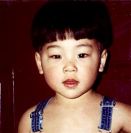
Welcome Home Woo Hyuk
The
Stages of Adjustment in a Toddler Adoption
By Barb Burke
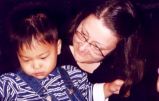 We
found this adoption/adjustment experience much different than the other
3 children we’ve adopted, coming into the family. I thought it might be
of interest to others in their pursuit of a toddler adoption. We
found this adoption/adjustment experience much different than the other
3 children we’ve adopted, coming into the family. I thought it might be
of interest to others in their pursuit of a toddler adoption.
Our son arrived home from Seoul, Korea on September 9, 1999 at 21 months
of age. He was a very exhausted, sullen little guy, who had a trying trip,
according to his elderly escort. He had a difficult time separating from
"oma", his foster mother, and she from him. He spent most of
his flight time, pacing the plane, calling out her name and sobbing in
deep despair.
He has gone through all the classic stages of adjustment that we’ve read
about and were prepared for concerning the special issues in dealing with
a toddler adoption. The book, Toddler Adoption
~ The Weaver’s Craft by Mary-Hopkins-Best gives a detailed and
accurate description of why toddler adoptions are unique in their own
right. I highly recommend anyone adopting a toddler between the ages of
12 mos. – 3 years to read this book. Please keep in mind though, that
the situations in this book cover all areas of difficulties. It is easy
to become alarmed over some of the experiences told by parents adopting
toddlers, whereas most toddler adoptions are very successful.
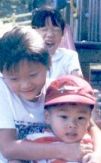 Our
son zoomed through every phase of adjustment at an intense pace, leaving
my husband and I exhausted. Thankfully, each stage was quickly done and
over with. Many children pass through these same stages at a slower pace,
taking up to a year, or even more to adjust. Some children only touch
on a few of these issues. Some parents claim their child went through
little or no adjustment. All children have adjustment issues to deal with.
There is not any such thing as ‘no adjustment’. Some are just less noticeable
than others. Our
son zoomed through every phase of adjustment at an intense pace, leaving
my husband and I exhausted. Thankfully, each stage was quickly done and
over with. Many children pass through these same stages at a slower pace,
taking up to a year, or even more to adjust. Some children only touch
on a few of these issues. Some parents claim their child went through
little or no adjustment. All children have adjustment issues to deal with.
There is not any such thing as ‘no adjustment’. Some are just less noticeable
than others.
Grieving
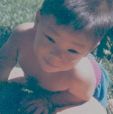 For
the first three days Woo Hyuk experienced terrible grieving for his foster
mother. He spent much of his time going to all the doors and windows in
our house, looking out and crying for her. He would constantly carry his
shoes around and hand them to anyone to be put on him, in hopes that we
were going to be taking him back to Oma. On his second day with us, I
was in our front yard with him and he turned to me and waved good-bye,
and walked off down the road with no intention of coming back. My husband
spent one afternoon walking for almost an hour around our aboveground
pool behind our son. Woo Hyuk was sure that Korea was just around the
next bend. He was not enjoyable to take out, as he only had his mind on
one thing, finding oma. For
the first three days Woo Hyuk experienced terrible grieving for his foster
mother. He spent much of his time going to all the doors and windows in
our house, looking out and crying for her. He would constantly carry his
shoes around and hand them to anyone to be put on him, in hopes that we
were going to be taking him back to Oma. On his second day with us, I
was in our front yard with him and he turned to me and waved good-bye,
and walked off down the road with no intention of coming back. My husband
spent one afternoon walking for almost an hour around our aboveground
pool behind our son. Woo Hyuk was sure that Korea was just around the
next bend. He was not enjoyable to take out, as he only had his mind on
one thing, finding oma.
Bedtime however, was not a problem for Woo Hyuk. His first night was
spent crying inconsolably for three hours between my husband and I on
our bed, very unhappy, scared, and uncomfortable. He would not accept
comfort from us, and would gently push our hands away repeatedly. His
sobs were heartbreaking. It was obvious he was suffering a tremendous
loss and his mournful cries were the same as those of someone experiencing
the death of a loved one. After about three hours, he suddenly stopped
crying, and crawled off our bed with an exhausted, but determined attitude.
We watched in disbelief as he climbed into the toddler bed we hadn’t even
introduced him to, curled up, and was soon fast asleep. He slept soundly
through the night after that, but needed my husband or I in the room until
he fell asleep.
Resignation
After those first 3 days, Woo Hyuk settled into the family routines,
challenging each and every one over the next couple of weeks. It took
two days to get him to sit at the dining room table and eat with the family.
After about two days of fighting a loosing battle with the bib, we decided
to have him wear it around the house, well before his meal, for him to
get use to it as he played. That worked, and now you cannot feed him without
him climbing into his chair and handing you his bib. Children are such
‘creatures of habit’, at this age, and routine is really the ‘foundation
for rebuilding the security’ they lose when removed from their accustomed
surroundings into new ones.
Bath time was another struggle and Woo Hyuk was not comfortable with
strangers bathing him, and that is what he thought of us as.
 He
cried and would not sit down while being bathed the first week; despite
the fact that he had been given two baths a day in Korea and was said
to enjoy them. I knew I would need more help since Woo Hyuk was our sixth
child, so my husband and I worked through Woo Hyuk’s adjustment with a
team effort. We took turns with his care, so he wouldn’t form a strong
attachment to the habit of only allowing Mom to do things for him. My
husband had took two weeks off from work to help out, and this was crucial
for us to form a routine for Woo Hyuk and take care of the other children’s
needs and not disrupt their routines. He
cried and would not sit down while being bathed the first week; despite
the fact that he had been given two baths a day in Korea and was said
to enjoy them. I knew I would need more help since Woo Hyuk was our sixth
child, so my husband and I worked through Woo Hyuk’s adjustment with a
team effort. We took turns with his care, so he wouldn’t form a strong
attachment to the habit of only allowing Mom to do things for him. My
husband had took two weeks off from work to help out, and this was crucial
for us to form a routine for Woo Hyuk and take care of the other children’s
needs and not disrupt their routines.
We realized that if we were going to offer him some sense of security,
we would have to establish a routine so his day seemed predictable and
safe to him. We routinely went through the necessary steps of carrying
for him (diapering, bathing, feeding, disciplining him mildly, etc) despite
his protest. We never put any strong demands on him during this stage,
but took a ‘baby steps’ approach, seeing an accomplishment in every small
improvement he made.
Honeymoon Phase
This was a very brief period for us. During this time, Woo Hyuk was mild
tempered and compliant. Taking him out and shopping in the stores, he
behaved very well. In church, he sat still and was quiet. He followed
the daily routines with acceptance. He was pleasant and smiled often,
initiating and responding with friendliness toward others in public. He
helped clean up after a day of play and was compliant to the simple family
rules we had set down thus far. He went down nicely at bedtime and cooperated
with dressing, diapering and bathing.
He was genuinely sweet and sincere, enabling us to see the ‘angelic child’
he was described as from the Korean social worker, and we were all falling
in love with him.
Click here to read Part
Two
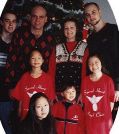 Barb
Burke and her husband have 6 children, four joined their family
by adoption. She is a wonderful advocate for children in need of families
and children with special needs. Visit her website www.angelfire.com/journal/adoptionhelp/home.html
for information on her family, special needs of children and an excellent
overview of resources for Financial Assistance for Adoptions. Barb
Burke and her husband have 6 children, four joined their family
by adoption. She is a wonderful advocate for children in need of families
and children with special needs. Visit her website www.angelfire.com/journal/adoptionhelp/home.html
for information on her family, special needs of children and an excellent
overview of resources for Financial Assistance for Adoptions.
|


